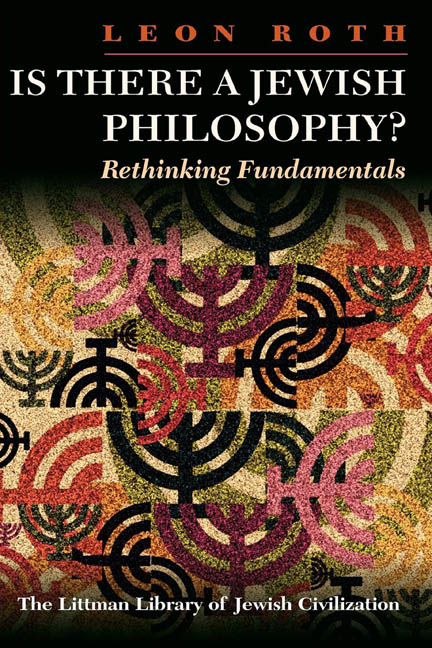Book contents
- Frontmatter
- Dedication
- Contents
- Publisher's Note
- Foreword
- Note
- Is there a Jewish Philosophy?
- Imitatio Dei and the Idea of Holiness
- Jewish Thought as a Factor in Civilization
- The Significance of Biblical Prophecy for Our Time
- Some Reflections on the Interpretation of Scripture
- Baruch Spinoza: His Religious Importance for the Jew of Today
- Judaism: The Elements
- Authority, Religion, and Law
- Moralization and Demoralization in Jewish Ethics
- Mysticism, Thick and Thin
- Back To, Forward From, Ahad Ha'am?
- Maimonides
- Bibliography of the Writings of Leon Roth
- Index
Jewish Thought as a Factor in Civilization
- Frontmatter
- Dedication
- Contents
- Publisher's Note
- Foreword
- Note
- Is there a Jewish Philosophy?
- Imitatio Dei and the Idea of Holiness
- Jewish Thought as a Factor in Civilization
- The Significance of Biblical Prophecy for Our Time
- Some Reflections on the Interpretation of Scripture
- Baruch Spinoza: His Religious Importance for the Jew of Today
- Judaism: The Elements
- Authority, Religion, and Law
- Moralization and Demoralization in Jewish Ethics
- Mysticism, Thick and Thin
- Back To, Forward From, Ahad Ha'am?
- Maimonides
- Bibliography of the Writings of Leon Roth
- Index
Summary
Introductory
1. The great bodies of constructive ideas on which modern Western civilization is built are conventionally traced back to Israel, Greece and Rome: morals and religion to Israel, the sciences and the plastic and literary arts to Greece, law and public administration to Rome. If this is true, it is true only roughly. No civilization can exist without possessing in some measure every one of these activities. Greece and Rome had religion and much of it survives today, just as Israel and Greece had, and bequeathed, law. Indeed, religion and art and science and law appear everywhere (howbeit in varying degrees) together. Further, there is much in modern Western civilization which is unique and original to it, and where the ‘legacy’ from the past is most apparent, it has been most modified in use.
This essay will make therefore no exclusive or pre-eminent claims. It will try to present Jewish thought as a coherent system of ideas; but it will be mindful of the fact that the truer the ideas, the more they may be expected to have appeared elsewhere. Nor will it insist on the connection between Jewish thought and the individuals known as Jews. In a sense, Milton's Paradise Lost or Randel's Messiah or Blake's Illustrations to the Book of Job are Jewish, although their authors were not. One may compare the connection of mathematical thought with its first inspiration in Greece, or of the Roman road with its original Roman builders. Roman roads were also built by other than Roman citizens; and mathematical thinking, although brought into the world with and by the Greeks and remaining (possibly) true to its Greek type, has produced results far beyond any Greek achievement. An old talmudic saying is helpful here. Why was the Law given in the wilderness? the rabbis ask, and answer: In order that no one country could claim proprietary rights to it.
2. This is true of ideas of any kind. They are by nature universal. They arise, presumably, in individuals, and they develop their power through communities. But to speak of them in sole association with one person or community is to belie their character. Indeed, the more general they are, the more their character as ideas is manifested.
- Type
- Chapter
- Information
- Is There a Jewish Philosophy?Rethinking Fundamentals, pp. 29 - 73Publisher: Liverpool University PressPrint publication year: 1999

